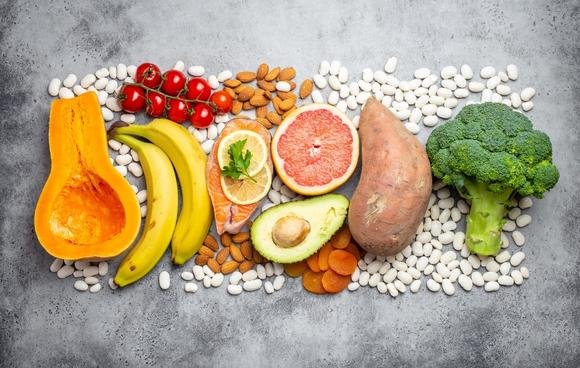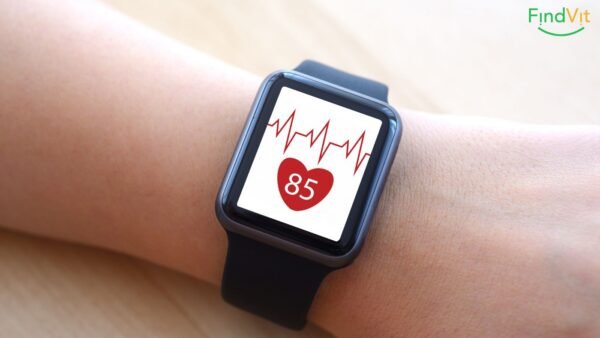Healthy potassium intake reduces risk of death in 20%. In addition, it lowers blood pressure, stops muscle loss, helps maintain bone mineral density and reduces the likelihood of kidney stones.
Many of us experience fatigue, weakness and other unpleasant symptoms. It is very important to remember that our body is out of balance, and many people are deficient in certain vitamins and trace elements, including potassium.
A lack of potassium can have very painful consequences for a lifetime, even putting a young person in bed. Although these are exceptional cases, potassium deficiency is very dangerous for the human body. Then the questions arise, what amount of potassium is needed by the body to avoid danger?
What is potassium?
Potassium is the third most abundant mineral in the human body. It allows the body to control fluid balance, transmit nerve signals and control muscle contractions.
Cells contain 98% of potassium. Of these, 80% is found in muscle cells, while the remaining 20% is found in bone, liver and erythrocytes (red blood cells).
There is potassium electrolyte, which enters the body. Electrolytes dissolved in water produce positive or negative ions that can transmit signals to the body. Potassium ions have a positive charge.
Electrolytes, an important substance for the body
In the human body, there is a constant turnover, for which electrolytes are responsible. They carry substances to different parts of the body. They also regulate blood pH, blood pressure, water content, and restore damaged tissues.
Thanks to electrolytes, the cells remain stronger, and it is harder for viruses and bacteria to pass through them.
Recommended daily rate
The World Health Organization (WHO) recommends a daily intake of at least 3,510 milligrams of potassium, and agrees that the majority of the world's population does not meet this recommendation.
A study by scientists showed that those who consumed a day 5,266 mg of potassium maintained an average of 1.6 kg more lean tissue mass than subjects with a potassium intake of 50 % less. High potassium intake is also associated with increased bone density, according to some studies.
Lack of potassium in the body
A lack of potassium can cause a number of symptoms and health problems, such as hypokalemia.
Between 3.5 and 5.0 mmol/l of potassium is considered a normal amount in the body. There are no typical signs of mild potassium deficiency. Potassium deficiency is considered serious when it falls below 2.5 mmol/l. And symptoms will worsen if the number drops even further.
Symptoms of low potassium levels include:
- Fatigue
- Weakness and muscle pain throughout the body
- Constipation
Low levels of potassium can also cause more serious problems. Such as:
- Respiratory disorders
- Painful constipation
- Tingling, numbness or itching, which is mainly felt in the hands, legs, feet
- Muscle spasms
Blood tests can detect low potassium levels, and changes to your regular diet, including supplements, can fix them. Regular medical check-ups can help monitor potassium levels in the blood and prevent a potential deficiency.
The benefits of potassium for the human body
The purpose of potassium is to neutralize the effects of sodium and help maintain a steady blood pressure. Potassium is needed to maintain the body's acid-base balance. Alkalis are chemicals that do not dissolve in water and are the opposite of acids.
Heart health and blood pressure. High blood pressure, cardiovascular disease are associated with low potassium intake. Limiting your salt intake is essential to lowering blood pressure, but it's also important to make sure you're getting enough potassium.
Higher potassium and lower sodium intake are important to reduce the risk of cardiovascular disease.
A daily intake of 4069 mg of potassium reduced the risk of death from ischemic heart disease by 49% compared to a daily intake of 1000 mg of potassium.
Nitrogen excretion, loss of bone mineral density, and muscle wasting can occur as a result of acidosis. For older adults, a diet rich in potassium can help maintain muscle strength.
When the blood and/or other body fluids become acidic, the body's acid-base balance is disturbed. This condition is called acidosis. A diet rich in acidifying foods such as meat, dairy, and processed grains causes metabolic acidosis. Acidosis is a common result of a standard diet high in processed junk food.
Foods rich in potassium are recommended
Potassium is found in many healthy, unprocessed foods.
Fresh greens, avocados, tomatoes, potatoes, beans, and bananas are some of the best potassium-rich foods. Heating food significantly reduces the amount of potassium in the food. Potassium is often lacking in processed foods.
Potatoes – source of starch and carbohydrates
Because of the starch and carbohydrates in this product, we often try to avoid it. However, this is not entirely a good thing. One medium potato contains 900 mg of potassium. One boiled potato with skin can provide a little more than 1/5 of the recommended daily allowance of potassium. In addition, potatoes provide dietary fiber, iron, vitamin B6 and C. If your weight is a concern, choose a large plate of fresh salad with lemon juice and two potatoes for lunch.
Sun-dried tomatoes
Potassium is also found in fresh tomatoes. However, it is much more in dried products. The amount of potassium in dried tomatoes is 1800 mg/100 g, or 40% required values. In addition, tomatoes activate the activity of the heart, they are rich in fiber, vitamin C and vitamin E, which help digestion and strengthen the immune system.
Include beans in your diet
Both white and red beans are high in potassium, with 600 mg and 1,000 mg, respectively. Beans are rich in fiber, protein and iron. They can be added to salads, stews and soups.
Dried apricots
Especially when you're looking for something sweet, this hearty snack packs a punch. Only after drying fresh apricots, the nutrients become more concentrated. Therefore, 100 grams of dried apricots contain 1162 mg of potassium.
Plums for our beauty and health
Raisins, dates, dried figs and other dried fruits are generally high in potassium. However, we specifically want to highlight prunes. Plums also contain iron, magnesium, phosphorus, vitamins B1, B2 and C, as well as potassium. According to research, plums maintain good bone health. Compared to women who ate dried apples, those who consumed ten prunes daily had increased bone density.
Avocados are not only fashionable, but also useful
One of the most useful fruits is the avocado. One avocado contains 975 mg of potassium, magnesium, phosphorus, iron, zinc, many vitamins and good fats, which are essential for a healthy heart and clear skin. It is also valued for its versatility, as avocados can be used in salads, desserts, sauces and drinks.
Salmon, a real gift for the body
Permanent "member" of the list of useful products. More potassium than any other fish 100g/628mg. Salmon also contains omega-3 fatty acids and vitamin D. According to a trend discovered by Harvard researchers, eating more fatty fish increases life expectancy and even reduces the chance of dying from heart disease by up to 35 %.
The power of spinach
A suitable side dish for meat and seafood dishes. Potassium is 558 mg/100 g. A food that should be eaten daily is spinach because it is low in calories and very beneficial for health.
Pumpkins and their health benefits
Different types of pumpkin have a disproportionate amount of potassium: 100 g of pumpkin has 437 mg. Pumpkin is one such vegetable that lasts a long time and can be prepared in a variety of delicious ways.
Oranges - a source of vitamins
A healthy day starts with a fresh orange. In addition to vitamin C, they also contain extra potassium, folic acid and B vitamins. A large orange contains 473 mg of potassium.

Vegetables and fruits during winter?
In fact, there are fewer of them in winter. Nevertheless, they still exist! Do not forget about the dietary fiber in the food. In addition, there is a lot of potassium in bananas. Although many people are "afraid" of these fruits, unripe bananas have just 100 calories and are packed with nutrients like potassium and fiber. It is advisable to eat 2 bananas for breakfast several times a week, even for those who are trying to lose weight, instead of a morning sandwich or monotonous oatmeal according to an individual nutrition plan.
The following foods contain the most potassium: beans and peas (1300 mg, 100 g), almonds (600 mg), certain vegetables (452 mg, 100 g), spinach, kale and parsley (550 mg, 100 g), and some in fruits (bananas, papayas, 300 mg, 100 g). People who eat a lot of processed foods and little fresh fruits and vegetables are often deficient in potassium.
Many processed foods are also high in salt. As sodium intake increases, more potassium is needed to balance the effects of salt on blood pressure.
Can potassium pose a risk to the human body?
Too much potassium can also have negative health effects. When a person consumes more than 4,700 mg of potassium per day, the body is at risk.
Hyperkalemia. For those with kidney problems, taking too much potassium can be dangerous. When the kidneys are unable to remove enough potassium from the body, hyperkalemia results from excessive potassium intake. Depending on how quickly the disease progresses, this can be devastating.
Potassium between 5.1 and 6.0 mmol/L is excessive and should be monitored and treated. More than 6.0 mmol/l is considered dangerous.
Hyperkalemia is often asymptomatic or has few symptoms. However, when they occur, they are similar to the symptoms of hypokalemia.
Chest discomfort, shortness of breath, and a fast heartbeat can be symptoms of severe hyperkalemia. It is very important to see a doctor because hyperkalemia can be fatal in this case.
Reducing potassium intake. Treatment of hyperkalemia involves reducing potassium intake. The amount of sodium and potassium in the body must be balanced. Constant maintenance of balance is necessary to maintain the smooth functioning of the body's systems.
If hyperkalemia is suspected, it is better to avoid foods high in potassium. Also, you should not use potassium supplements or salt alternatives. None of them can prevent the increase in potassium.
Potassium is important for cell function
Cell protoplasm (the main material of the cell, the living contents) contains potassium. Three physiological properties that are associated with protoplasm are metabolism, reproduction, and irritability.
Lack of potassium can irritate nerves and muscles, reduce appetite, irritate the digestive system, weaken blood vessels and muscle tone, disrupt heart activity, and make a person feel sleepy.
Because potassium and sodium are in conflict with each other, meals must contain adequate amounts of both nutrients. People who consume more sodium and less potassium than recommended have a higher risk of high blood pressure, which increases the chance of stroke.
Potassium is necessary for the body
So, the body needs potassium to function properly. It is just one of many substances needed by the body. Eating a healthy and balanced diet is essential to maintaining good health. Not to mention stress management, sports, exercise and other health benefits.
How find out which vitamins, minerals or other supplements the most appropriate at the moment? Try it free test "Your Day" ! where you will find out needs of the body and you will get personal recommendation!











